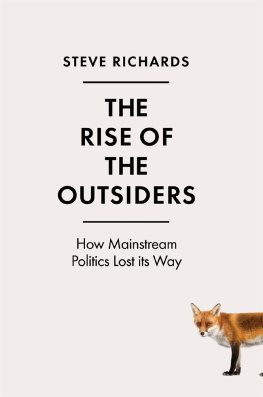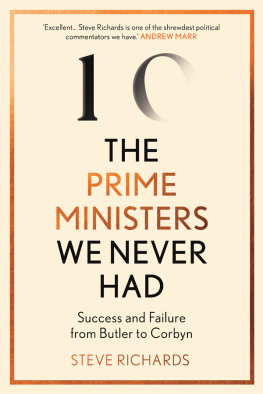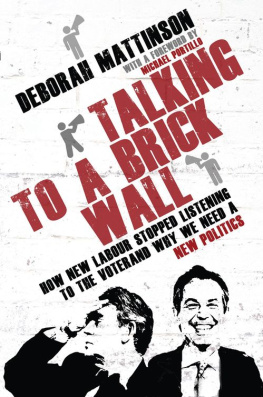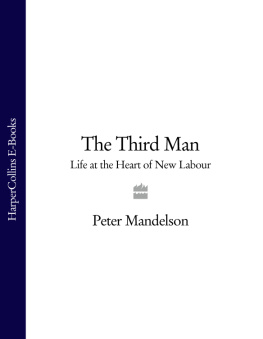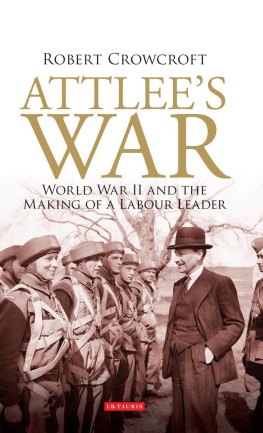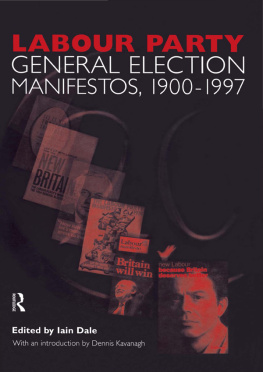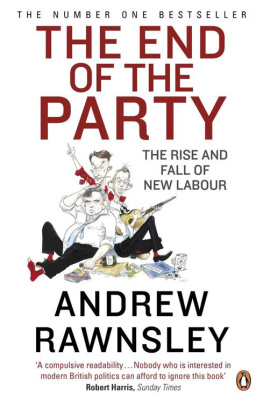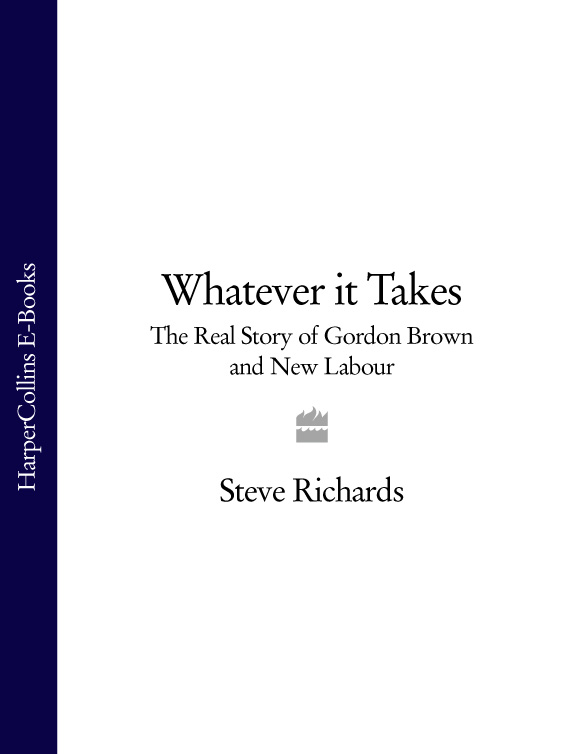The right of Steve Richards to be identified as the author of this work has been asserted by him in accordance with the Copyright, Designs and Patents Act 1988
All rights reserved under International and Pan-American Copyright Conventions. By payment of the required fees, you have been granted the non-exclusive, non-transferable right to access and read the text of this ebook on-screen. No part of this text may be reproduced, transmitted, down-loaded, decompiled, reverse engineered, or stored in or introduced into any information storage and retrieval system, in any form or by any means, whether electronic or mechanical, now known or hereinafter invented, without the express written permission of HarperCollins ebooks
From the beginning the New Labour project was deliberately evasive. The term new, first used by Tony Blair on the day he became leader, was both an early clue to what was to follow and a red herring. Who could oppose a force that was new compared with one that was old? Most of us would prefer a new set of clothes to the older ones, at least until we find out more about what the clothes are like. But beyond a superficial attraction, where did the evasive adjective lead? The term was apolitical, like so many of the adjectives that were applied with such misleadingly feverish energy in the years that followed the emergence of New Labour.
The clue was the act of depoliticization. Newness was neither a quality on the left nor the right. The red herring was the notion that the adjective paraded with such a flourish conveyed clear direction, a party moving away from its past towards a new future, forward not back, as the party put it in a slogan for the 2005 election. Blair relished the meaningless metaphor more than any other. I do not have a reverse gear, he told his party conference in 2004. Actually he used that particular gear quite a lot, as all leaders do. But the image tells us nothing about the values of an individual or the party they lead.
The apolitical adjectives were not alone. Most of the rows that attracted so much intense attention for more than a decade were over issues relating to integrity, eruptions of temper and personal rivalries. These were appropriately apolitical rows for the depoliticized decade. Debates about integrity can be staged about any public figure. They do not take us very far in discovering where these figures come from and are trying to get to, beyond an uneasy sense that their adoption of an apolitical adjective in the first place was partly because they were not entirely sure where they were going as a political force either.
The subsequent internal divide within New Labour blurred further the original evasion. Suddenly in the mid-1990s there were Blairites and Brownites springing up from nowhere in large numbers. The noun became an adjective, the adjective a noun. I would not have been surprised if I had heard a cue on an interview programme along the lines of: Joining me now is the Blairite, Tony Blair. Both adjectives were applied a thousand a times a day in attempts to shed light. Most of the time they obscured while purporting to clarify. Was a Blairite someone who was merely loyal to Tony Blair? Was a Brownite someone who was personally loyal to Gordon Brown? Did a Blairite espouse a set of values and policies distinct from a Brownites? If so, what were they?
The lack of clarification enabled the creators of New Labour to build up a big tent of support in the early years, as David Cameron and Nick Clegg sought to do when they formed their coalition after the election in 2010. Cameron and Clegg proclaimed a new politics, the ubiquitous fresh-faced adjective in place once more. New Labour. New Politics. The coalition was not a break with the past, but its echo.
Anyone could read more or less what he or she wished to into a project that claimed vaguely to be in the radical centre. When New Labour was popular, support came from the right and left. But when it became unpopular there were unavoidably a thousand contradictory interpretations as to what had gone wrong. These post mortems were as foggy as the intentions of the original political project. As a result, the New Labour era remains one of the most misunderstood in modern times. Millions of words have been written on the subject already and yet the myths persist.
The role of Gordon Brown in the New Labour years is especially hazy and elusive. Like a central character in a whodunnit, his role and character seem obvious until we step back to question the assumptions that shape our perceptions. In spite of the mountain of words written about him there are many unresolved questions. Here are some of them, although others surface in the coming pages:
Why was Brown so seemingly poorly prepared for his period as Prime Minister when he had planned for his tenure at the Treasury like a military campaign?
Why did someone singled out by the highly demanding Peter Mandelson as media friendly in the 1980s come to be regarded as a hopeless communicator by the time he became Prime Minister?
Why would some of Browns staff have died for him, while other colleagues loathed him?
Why was Brown, so gripped by the need to address poverty and poor public services, the best friend of bankers and an ardent supporter of a light regulatory regime for the City?
Why did a Chancellor who made a fetish of being prudent and reducing borrowing take huge risks with the level of public debt towards the end of his tenure at the Treasury?
Why did Brown react quite so badly in 1994 to Blair securing the leadership, a reaction that determined so much that followed? After all, other highly ambitious politicians have failed to become leader and reacted more calmly.
Were the differences with Blair beyond fuming ambition and if so what were they?
What are the lessons for a party, any party, when two figures and their closest advisers seize total control?
How significant was the role of the media as Blair and Brown played out their dance?
How to explain a figure that claimed his Presbyterian father was his model and spoke of his moral compass yet presided over a paranoid court with close colleagues in fear of being briefed against and one of his oldest friends, Alistair Darling, claiming the forces of hell were unleashed against him in the early autumn of 2008?
How was such a devoted bibliophile so contorted, dense and plodding when he wrote and spoke in public?
The questions accumulate and feed on themselves. One prompts another. The answers shed light not only on Browns long career at the top of British politics, but on the entire New Labour project and on the challenges for the coalition government formed in the summer of 2010. In order to make sense of Browns stormy premiership and the New Labour years that preceded it I begin where the seeds were sown, the summer of 1992.


